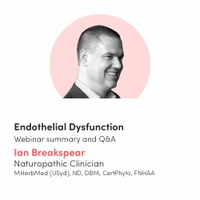Presented on 29/03/23
A blueprint for energy and vitality during perimenopause and beyond
With life expectancy in Australia reaching into the 8th decade, women are now living at least one third of their life after menopause. The information and research on how to thrive for this time is only just gaining traction and research funding to a level it deserves. The dynamic state of a woman’s body is a challenging puzzle for practitioners and clients alike. How can we best guide and support those going through menopause to thrive rather than just survive?
Kira Sutherland discussed the many areas of life that need focus to support the dynamic female body. Energy production, exercise needs, weight management and lifestyle support were highlighted to enable practitioners to create a blueprint of actionable steps to help their clients thrive.
Webinar overview:
- Mitochondrial support
- Sarcopenia
- Post exercise window fuelling
- Macronutrient considerations
- Supporting heart rate variability and the nervous system
- Herbal considerations for adrenal and nervous system support
- Sleep hygiene
- Key takeaways to consider implementing
Further discussion on:
- Research and women
- How women are different
- Oestrogen and progesterone
- Metabolic consequences
- The energy systems
- Carbohydrates and fats during exercise
- Strength training
- Metabolic effects of menopause
- Altered eating and sleeping patterns
Key takeaways:
- Exercise – cardio, weights, HIIT, strength training
- Eating before and after training
- Address hormones and insulin resistance
- Cyclical/intermittent dieting
- Eating by 10am even if doing IF (cortisol)
- 3 meals, no snacks
- Optimum protein and leucine intake
- Protein threshold theory – eat protein first
- Larger meals at breakfast/lunch, smaller at dinner
- Know your calorie and macro needs
- Stress reduction/cortisol control
- Track your heart rate variability
- Nature therapy/forest bathing
- Learn your somatotype
- Supplements/herbs to assist in weight loss, adrenals, nervous system and mitochondrial health
- Analyse cravings, deficiencies and habits
- Change up your exercise (SAID/specific adaptation to imposed demands)
- Cold thermogenesis/showers/bathing/less clothing
Some additional questions that were not answered on the night:
1. You mentioned using magnesium bisglycinate a few times, but what form of coenzyme Q10 do you usually prescribe?
I often use a ubiquinol in the range of 150-300
2. With protein at 1.6-2g/kg, if someone is say 130kg, does this still apply or is there a limit? Eating 260g of protein seems like so much protein to consume?
Great question! When there is more than 10 kilos to lose I will also use the half way point between their current weight and their realistic goal weight.





